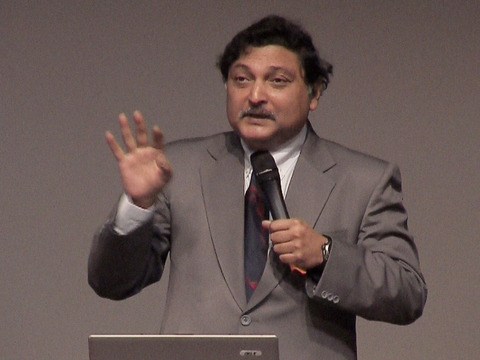Oh, good evening, everyone. My name is Alessandro, and I am also a functional illiterate or I act like one, sometimes at least. Strange as it may seem, that was the good news. The bad news is that you could be one or could become one, you might behave as if you were in certain situations, you may not notice it: it can happen to anyone. What? You don't believe it? Okay, so let's do this, let's do a practical example in which you might identify. Here it is: we are on WhatsApp, and Dario Chiucchetta is my videomaker, who also made the video you're watching possible. Suddenly, he sends me an article by Wired, which says: “What changes in YouTube's new terms of service." After his classic greeting: "Hey there, did you see?" I read a sentence that deeply worries me, saying: “YouTube's introducing a tax on content creators, it's a big deal. We'll talk in a meeting, but in the meantime avoid loading anything.” In that instant, something clicks in my mind. I can already feel the weight of my wallet thinning, and I answer with a dirty word that I'll obscure. “There's no way they can keep changing and messing things up, we'll probably pay a disproportionate price with all the videos we upload.” Dario replies, with a little too many suspension points: “Eh...…. it's a big deal, the details are explained in the article”. I continue, ignoring his subtle suggestion and I say: “What do other YouTubers say? It doesn't really make sense!” Dario continues, with some sort of suspicious sarcasm: “Endless despair." But now I'm like a bull that sees red: “We're going to end up on Twitch,for fuck's sake! Now, when I get to the office, I'll try writing to YouTube Help to ask for explanations. Since when is this supposed to take effect? Let's hope it's not asso retroactive.” I wanted to write also, but I mistyped. “Absolutely, then send the screenshots," says Dario, “I'll deal with them!" Dario replies with an old video of me explaining what functional illiteracy is and then adds: “Maybe read the article, and notice what day it is." At that moment, I realize it's April 1st: my world collapses in an instant, I read and obviously nothing is written on it, so I say, "It doesn't say anything about taxes or any of that s**t, I hate you!" "I'll blackmail you for life and I'll take instant screenshots", "You're fired." And here he is. a superficial and distracted functional illiterate who stupidly believed in a silly fake news created by its videomaker and who got outraged without hesitation, before opening the link and reading the article. A functional illiterate who will then have to buy the silence of his videomaker with a substantial salary increase and pray to every deity ever worshipped by a human being that nobody ever finds it out, until he decides to tell it in front of everyone at a TEDx. Nice move! Anyway, this embarrassing example, that I will spend the next few minutes trying to remove from my mind, actually gave us a little clearer, a little more concrete idea of how things are. Yes, because it is often not really clear to us the meaning of the term “functional illiterate”. However, after seeing an example, we can venture a theoretical definition. If an illiterate is a person who, by classical definition, is unable to read, write or count, the functional illiterate is who possesses these basic skills but is not able to apply them effectively to the situations and contexts of his daily life. He struggles to understand a text, from a newspaper article to a bill, can't distinguish a true news from fake news, struggles with elementary calculations, has limited skills in the use of IT tools. Of course he/she has knowledge about the world, but they are extremely superficial and linked solely to his/her context, life experience and to what he/she is surrounded by. Lacking of critical sense and abstraction capacity, he/she fails to evaluate and use information to achieve goals, remaining passive. A few statistics, just to depress us all together. According to 2016 data, in Italy, functional illiteracy of the most severe and widespread level would affect 27.9% of the population aged between 16 and 65, almost one in three people. According to OECD Programme researches that deals with this, Italy is in the last places among the States that joined the survey, in almost every field. It ranks second to last in terms of mathematical skills. Compared to some years ago the situation seams to be slowly improving and the gap is narrowing, but we can still talk about an incredibly widespread phenomenon. But it is not over, there's a problem within the problem. and we are finally approaching the heart of this speech. Yes, because if it is true that we can clearly identify the sad consequences of functional illiteracy at a social, economic, political and criminological level- just think of the devastating spread of fake news, the growth of populist movements, and the proliferation of WhatsApp groups where our parents exchange pictures of puppies with the words “Rise and shine!" - it is equally true that it is still extremely complex to define it in a scientifically precise way, to study functional illiteracy and to really understand the phenomenon. It's not really that clear, how to determine who is and who is not, a functional illiterate and you can't create a vaccine for a virus that no one can isolate. There are proposals, operational definitions, but it's still hard to pinpoint exactly the variables to measure it, which tests to address, how to apply them, how to adjust and consider the influences of thousands of factors involved. You know, for example, that the phenomenon is linked to schooling and training, and yet a significant percentage proves to have it, after high school or college too. It is known that the phenomenon is linked to the socio-economic condition, but we observe it commonly even in wealthy contexts. It is known to be linked to cognitive deficits or problem conditions and yet it affects people without any such difficulties. It is also known to be age-related, and yet it is also found in young and very young people. However, all these factors are beyond our direct control and there's very little we can do. By the way, science in this field still has a long way to go: functional illiteracy hasn't been resolved yet, only approximately. This is where we come back to ourselves, to anonymous functional illiterates, to this chair, to the confession with which I opened this speech, because maybe the point that really interests us is not so much to determine who is and is not a functional illiterate, it is not to apply labels, but to understand how and why anyone, in a certain condition, may act as such, contributing to the consequent disasters. Yeah, anyone, really anyone. Let's do a thought experiment, a stupid thought experiment, the ones I prefer. We take the person who, in our collective imagination, is the furthest from the concept of functional illiteracy, as far as we can think of. A person who symbolizes intelligence, science, overwhelming superiority of intellect. Yes, Albert Einstein, just him: hair, moustache, pipe and brain included. None of us have any doubts about Einstein not belonging, now and in the past, to the normal stereotype we have of a functional illiterate. Well, let's imagine him after a working day, in front of four screens, bombarded with emails, exasperated, tired, with his boss stressing him out and without any knowledge of foreign languages. He suddenly ends up with a smartphone in his hands, of which he doesn't understand even half of the functions. He opens a random social network, of which he has no knowledge, while at the same time he gets notifications from his cousin who writes to him on WhatsApp and suddenly this appears on his screen. Come on, let's not exaggerate: let's say this. Still too much, all right. Poor Albert, let's try this. Well, that's it! Now, according to you, prompted to immediately comment the post, would he behave more like a Nobel Prize winner or a functional illiterate? Would he realize he's dealing with a fake news? Would he open the article, read it? The truth is, we don't know, but if I had to bet I would say that, probably, even a guy like Einstein wouldn't get out from that situation. The Caps Lock is always around the corner. But then we, poor anonymous functional illiterates, what should we do if even Einstein can't save himself? I want to talk to you about four factors that can contribute to make us behave like functional illiterates and give you just as many tips to keep them at bay. Let's start with the first, the so-called information overload: which sounds cool in English, but if I say it in Italian it's scarier: "cognitive overload of information". It sounds less cool now, doesn't it? Well, we're bombarded with information like never before in human history: too many, too fast, too different from each other and our brain didn't evolve to handle them. The reasons are simple: the internet and the mass media. We read texts less and less and scroll them more and more, we get zombified by scrolling through the Netflix list without being able to make a decision, we interrupt continuously what we're thinking, doing, sa... Excuse me a second, I got a notification... I even bought a phone that opens up, so I have more screens to read emails at the same time, while I reply on WhatsApp and meanwhile I also watch a video of Montemagno. Coming back to us, we wake up and the first thing we do is to immerse ourselves in a flow we are no longer able to get out of. Cognitive overload leads us to superficiality, multitasking, overhaste, to the lack of time and resources to stop and analyze critically. And this is where functional illiteracy is ready to pop out. We must claim our right-duty to mono-tasking, silent notifications, to do one thing at a time and do it right. But I admit I say this on this virtual stage but I don't usually practice what I preach. The flow of information enslaves me, but the truth is, if we want to express our skills at the highest level, exercising our critical sense and analytical ability, we have to learn, if not to stop, at least to direct that flow, to stop it when we need it. Try this: shock therapy! Remove the notifications, mute all social media and all apps not strictly essential to your work or to your personal life. Make sure only those who matter can interrupt you: for everything else you will have to intentionally open an application. Then shift the position of the application icons on your smartphone screen and move them at least once a week to break the automatisms. Finally, get used to paying attention if you do more things together and return to only one task at a time. No multitasking! The second factor is the lack of understanding of the context, especially on social networks. Stop for a second and think: when was the last time that you opened any social network on your smartphone? Facebook... whatever you want. How long? Ten minutes, an hour, a minute? When was the last time that you have read a book calmly and carefully? We all live on social networks now, they are a huge part of our lives, but if you think about it again, it's something new. Facebook was born in 2004, 17 years ago, YouTube in 2005, Twitter in 2006, Instagram in 2009, Tik Tok in 2016. It's a new technology, we don't know anything about it and even less do those who were not born and raised using them. It is normal that you struggle to use them critically, to inhabit them in a civilized manner, to understand their hidden mechanisms. I'm not referring only to boomers, don't necessarily think about the uncle who shares racist fake news mistyping an exclamation point with 1. When I was 18, Facebook was the news of the moment and I'm 32, not 60! And yes, social media play with our emotions, make us irrational, close us in bubbles that radicalize us and train us to comment before we understand, to get outraged before clicking, as happened to me with that article, to scroll down before thinking. And those who don't use them often or didn't have the time or resources to understand its subculture, to learn its intrinsic functioning, will find be shocked and will be more likely to behave like a functional illiterate. Before you write, before you comment, before you chat and get angry for an article that doesn't even say what you think, before you get emotional about what you read or don't read, stop to think about the context: in which context are you? What social network, newspaper, magazine, television show, or chat is it? What are its rules, its mood? Who are you talking to? Is irony involved? Could this be a fake news? Are there different opinions? Are there any sources to verify it? Is what I am typing or saying appropriate to the context? Don't you think that publicly insulting a high office of the State may bring trouble? It has to become an automatic reflex, a habit. An established habit to stop, question, evaluate and weigh, before reacting. Third key factor in deepening our latent functional illiteracy is language, indeed languages... english in the first place, but also Italian to be honest. It wouldn't hurt to learn it deeper... Anyway, the whole world, especially the one on the Internet, uses more and more terminologies linked to the language of Queen Elizabeth and it becomes more and more inconvenient not to have a basic knowledge of it. Not only that! There are loanwords, neologisms, hybrids: a playground for linguists around the world, a nightmare for those who doesn't know them, a soil of ignorance more than fertile for functional illiterates. It may be trivial, but let's learn English, let's familiarize with information and internet neologisms: if there's a word, an expression or a sentence that we don't understand, let's stop and find out what it means before continuing reading or listening, always, without exception! I call it "the tank approach", it's one of the cornerstones of effective reading: you make sure you have understood a sentence or concept well and then you move on to the next one. Slower in the short term maybe, but safer, more functional. Finally, last but not least in terms of importance: the lack of habit of in-depth analysis, of study, the liability, the progressive decrease of the hours and days spent to really read or listen, really learn, really experience. We are collectively out of practice at critical thinking, learning and research. We're out of practice and the more we meddle, the more we struggle to apply language, calculation and thinking skills that we learned thanks to our education. So let's practice, read, listen, argue, come out of our bubble, study, learn something new, play, ask questions, investigate, let's return to being protagonists of our relationship with information, with reality. Let's stop being passive spectators. Let's get used to actively participating in everything that crosses our path. Zombie mode can be fought and defeated, I promise! Bonus tip: let's stop looking for someone else to define functional illiterate, let's start looking at us in the mirror, or reflected on the screen we have in our hands. Maybe we'll meet here in a few years, in our circle of anonymous functional illiterates and maybe we'll have a few less embarrassing stories to share. Thanks.
Related talks

Charles Leadbeater: Education innovation in the slums

Chris Anderson: How web video powers global innovation

Sugata Mitra: Kids can teach themselves

Anant Agarwal: Why massive open online courses (still) matter

Andreas Schleicher: Use data to build better schools
